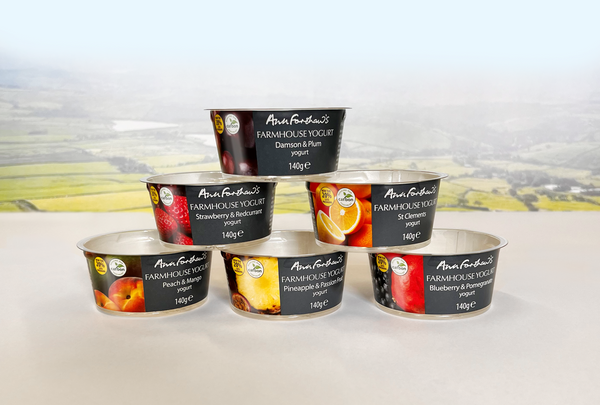Alston Dairy introduces ground breaking sustainable pots




A fully recyclable pot produced by Keighley based PFF Packaging has been launched by Alston Dairy as part of its Ann Forshaw’s Farmhouse Yogurt range.
The 140g pots use less plastic than equivalent PET packaging and more post-consumer recycled (PCR) materials, optimising the resources used and making the packaging easy to recycle.
PFF’s ‘IMPAC-T’ packaging is manufactured using a minimum of 50% PCR PET and up to 100% PCR card with any virgin board content sourced from certified sustainable forestry.
The plastic and card can be easily separated and both components can be reprocessed back into packaging, making the pots fully recyclable.
THE IMPAC-T process offers a 46% carbon footprint reduction compared to the current assembly system (independently verified).
PFF is one of the largest independent food packaging manufacturers in the UK with sites in Keighley, Yorkshire; Washington, Tyne and Wear; and Sedgefield, County Durham.
The Alston Dairy order follows a £2m investment in a ground-breaking thermoforming system at the Sedgefield site, part of a £4m investment programme in new process technology.
Alston Dairy produces the ‘Ann Forshaw’s’ branded yoghurt using milk from the farm’s herd of 350 British Friesians.
The dairy is renowned for its ‘from cow to pot in 24 hours’ process, with the milk sometimes only a few hours old.
Business founder Ann Forshaw said: “Sustainability is very important to us. We are very proud that 100% of the milk that goes into our yogurts comes directly from our family-run farm and is pumped directly into our dairy so there are zero food miles. A fully and easily recyclable pot is key to maintaining a low carbon footprint for our yogurt.”
Ian Smith, PFF Group sales director said: “PFF has supplied packaging to Alston Dairy for more than a decade and we know how important sustainability is to the business and its customers.
“Our IMPAC-T product uses less plastic than equivalent PET packaging and has been introduced amid increasing demand from food manufacturers, retailers and the public alike for plastic reduction. The packaging has the potential to revolutionise the dairy sector, as well as other food sectors where sealed-in freshness, strong branding and lower carbon footprint is essential.”